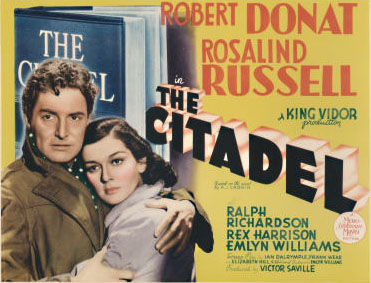Scottish physician and novelist A. J. Cronin published the novel, The Citadel, in 1937 as an eye-opening look at the contentious subject of medical ethics. It examines the very real issues of preferential treatment of wealthy patients over the working class and the doctors who get into the field purely for financial reasons rather than to make a difference in people’s lives. It was so well received that it helped usher in widespread reforms in the publicly funded healthcare systems in Britain a decade later. A year after its publication the novel was optioned and made into a film by MGM studios, departing from some of the novel’s details but maintaining the important message, even moralizing about it in a way that comes across a little heavy handed. There are moments that feel shoehorned in in service of the message and don’t quite feel organic but the message being conveyed is still an important one nearly ninety years later, especially in countries without a program like the National Health System.
The story follows Dr. Andrew Manson (Robert Donat), a newly licensed Scottish doctor who is eager to get out into the world and make a difference with all the new techniques he has learned in medical school. His eagerness, however, runs head first into reality when he takes a position on location at a mine. One condition for taking the position is that he be married. Fortunately he has been seeing a local school teacher, Christine (Rosalind Russell), and he uses this situation to propose to her. For years the other doctors at the mining colony have treated the symptoms for the overwhelming number of patients with respiratory desease rather than figure out the root cause and, when Manson refuses to just dispatch medication to mask the condition, he finds himself with fewer and fewer clients willing to allow the tests that just might save their lives. When the mining board votes to allow him to stay, on condition of him “toeing the line,” he resigns and moves to London.
In London his lofty purpose gets eroded in the face of reality. With few clients and no established practice he and his wife are forced to live in squaller, enjoying a cheap meal as a luxury. A chance encounter with a former medical student friend, Dr. Lawford (Rex Harrison) shows him that there is money to be had by catering to rich hypochondriacs who have plenty of money to dispense for unnecessary services. While this brings with it wealth it slowly erodes away at Manson’s humanity to the point that he begins to see his position only in terms of what it can do for his wallet. Christine is at first enchanted with the expensive gifts and freedom having money brings but that soon wears off and she wants to lead her husband back to the man that she married even if it means returning to a life of poverty.
The plot of this film, and the novel before it, was a reaction to the problems that existed in the medical programs of the time. Cronin recognized the problems that existed in the system that benefitted the wealthy and left the poor to struggle, either ignored or under treated because of their lack of money. Changes needed to be made and this story brings that to life personified by a poor little girl, daughter of a friend of the Manson’s, who’s gotten ill and nearly dies because Dr. Manson is too busy to treat her once he’s gotten a taste for wealth. Her face is that of the multitude of less fortunate who get prioritized last because of their station in life.
In similar fashion, the lonely minors who are showing symptoms of lung disorders from breathing in the dust in the mines are kept ignorant and superstitious, reliant on a prescription that makes them feel a little better all the while they are slowly being poisoned by the very company they work for. The minors have the right to remove their business from one doctor if they don’t like how they are being treated and exercise that right as soon as Manson tries to legitimately treat them bucking the status quo. It’s two very different situations that point out the same basic problem: it’s not profitable to do what is right.
This film came out nearly ninety years ago and pointed out the flaws of the British medical system. The same flaws existed in the Americas and, to a degree, still do. Laws have been enacted to ensure a patient cannot be turned away regardless of their financial means but those without the money get the bare bones treatment and then released whereas those with the means to pay still get priority. The price of medications is outlandish and, even with insurance, many critical procedures are withheld without a substantial down payment, usually well out of reach of the average citizen. The expense of medical treatment is so expensive that many ignore symptoms or put off preventative measures out of fear of the bills that come with it, often leading to much worse health issues because of it. One of the leading causes of bankruptcy is medical debt. It is a broken system that needs to be addressed. The Citadel addresses that head-on, bringing the subject into the minds of millions of people in the 1930’s and 40’s, inspiring reforms that prevail in Britain, and many other countries, to this day.
Academy Award Nominations:
Best Picture: Victor Saville
Best Director: King Vidor
Best Actor: Robert Donat
Best Adapted Screenplay: Ian Dalrymple, Frank Wead and Elizabeth Hill
____________________________________________________
Release Date: November 3, 1938
Running Time: 110 Minutes
Not Rated
Starring: Robert Donat, Rosalind Russell, Ralph Richardson and Rex Harrison
Directed By: King Vidor








Comments
Post a Comment